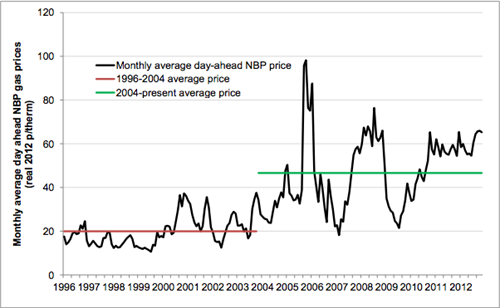Anyone heard of ‘Ovo Energy’?
Probably not.
Which raises the question why would the BBC give them a nice little spot on its UK News page and ‘report’ their comments without challenge?
In this post I noted that energy minister, Ed Davey, had said:
‘Rising gas prices have been the cause of rising energy bills at the moment.’
Thoughtful in the comments linked to a BBC ‘report’ saying:
Wholesale energy prices ‘not going up’, says Ovo Energy
http://www.bbc.co.uk/news/uk-24606614
Stephen Fitzpatrick, MD and founder of Ovo Energy, said he had not seen wholesale prices rise for about two years.
“If they’re buying more expensive gas, more expensive electricity, in a large part we think this is because they’re selling it to themselves”.
The BBC’s write up is short and based purely on what ‘Ovo’ said.
However in the actual interview the BBC interviewer stated that ‘independent sources say that wholesale prices have gone up 8%.’
Question….Why is that counter point not in the write up?
Ofgem…the Office of Gas and Electricity Markets…so presumably they know what they are talking about, said this:
- Wholesale costs are the biggest component of the average bill, as shown in the pie chart above.
- Over the last ten years, wholesale electricity costs have risen by around 140 per cent and gas costs by 240 per cent.
- In the last year, wholesale costs have risen by around £10 to £610 of an average annual dual fuel household bill.
- The wholesale price of gas for use this winter is 8 per cent higher than the price of gas for use last winter.
- The wholesale price of electricity for use this winter is 13 per cent higher than the price of electricity for use last winter.
Gas 8% higher than last year.
Electricity 13% higher than last year.
And yet the BBC allow Ovo to claim there has been no rise in 2 years.
Which is odd really because a quick perusal of their own website tells us this:




Now I don’t know about you but as I read that it tells me that wholesale prices for both gas and electricity have gone up in the last twelve months.
So when Stephen Fitzpatrick, MD and founder of Ovo Energy, said he had not seen wholesale prices rise for about two years he was lying.
Perhaps he forgot his company’s little boast:
‘We try our best to be open and honest with our customers, so we thought you may be interested to see what the prices actually are on the wholesale market.’
The cost of gas has risen by 240 per cent over the last ten years, according to Ofgem, acting as the main driver of rising energy bills.
This graph shows that in 2011 prices were under 60 and are now nearer 70 pence per therm:

So just why did the BBC, despite knowing wholesale prices have gone up allow him to get away with that and give his company a prime spot on their website?
As the company claims it is ‘greener’ than most, using more renewable energy, is it possible that the BBC were giving it a little nudge in the Public’s consciousness?…maybe the BBC pension plan has invested in this little company…who knows.
It certainly fits in with the BBC’s own agenda…helping out the ‘little guy’ against Big Business and it can’t hurt that Ovo is just that little bit greener.
This from the Energy and Climate Change Committee might also help judge why prices have risen…..
The main driver behind energy price rises has been wholesale gas and electricity costs, but
network charges, energy and climate change policies, and company costs and profits also
contribute. In future, DECC estimates that its energy and climate change policies will add 33% to the average electricity price paid by UK households in 2020, in addition to any potential wholesale price rises.
DECC suggested that the main drivers of recent increases are: wholesale energy costs,
estimated to have contributed at least 60% of the increase in household energy bills between 2010-2012; network costs, supplier operating costs and profit margins, estimated to have contributed around 25% of the increase; and the costs of energy and climate change policies, estimated to have contributed around 15% of the increase.11 Energy supply companies argued that the majority of the costs which had contributed to energy price rises are outside their control.
In its recent report, Estimated impacts of energy and climate change policies on energy
prices and bills bills, DECC reported that the average gas prices paid by UK households in 2012/13 were 5% higher due to Government energy efficiency policies such as the Energy Company Obligation (ECO) (see table 10 10). They claimed that the estimated impact of policies on household gas prices was expected to remain broadly unchanged to 2020.
The average electricity price paid by UK households in 2012/13 were 17% higher due to Government energy efficiency policies and the added cost of supporting renewable energy.
In the future, DECC estimated that the impact of these policies on the electricity price could increase to 33% in 2020 (in addition 20 to any potential wholesale price rises).





